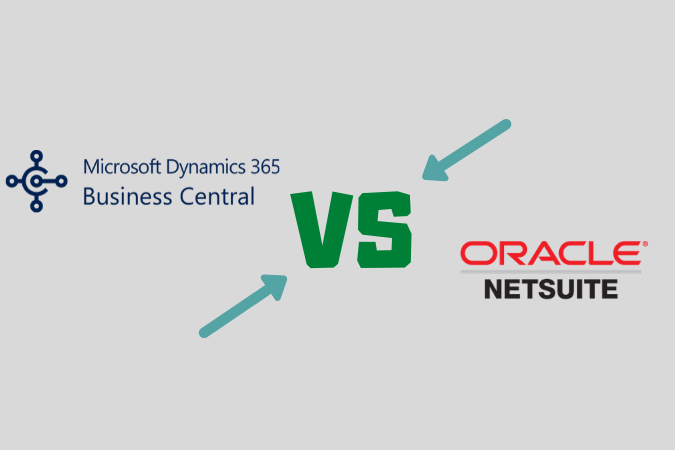Microsoft Dynamics 365 Business Central VS Oracle Netsuite
Microsoft Dynamics 365 Business Central VS Oracle Netsuite
-
March 4, 2020
- Posted by: Shashi Ranjan
- Category: Microsoft Dynamics 365 Business Central VS Oracle Netsuite
No Comments

- March 4, 2020
- Posted by: Shashi Ranjan
- Category: Microsoft Dynamics 365 Business Central VS Oracle Netsuite

Microsoft Dynamics 365 Business Central (MSD 365 BC) and Oracle NetSuite are the two leading ERP solutions (enterprise resources planning solution) with overlapping features and functions. While these solutions may share the capability, they have slightly different areas of focus. And their developers take a different approach to software designs. This means one may be a better fit for the business than the other.
Scalability
- Microsoft Dynamics, in general, has more features and the functionalities which may appeal to an SME as it grows in size and operations, especially if the customizations and the integrations with the third parties are required.
- Oracle NetSuite provides the scalability through a range of standard features; new features can be added on, but the set of the features has some limitations as does their customization.
Upgrades
- Microsoft Dynamics 365 uses a single-tenant architecture and the client is not forced to accept and install all the latest updates. Updates can be tested in a staging environment to ensure there is no business impact prior to the launching production.
- Oracle NetSuite updates are rolled out for all the clients and the clients do not have a choice whether to apply them because of the multi-tenant architecture. This is irrespective of the fact that they might be detrimental to their current business use due to their unforeseen impact.
Future-Proofing
- This is one of the most important yet often overlooked part of the evaluation process. Microsoft Dynamics (MSD) benefits from a robust product roadmap courtesy Microsoft’s extensive investments and the focus on research and development. The ever-evolving AI capabilities (Artificial Intelligence Capabilities)in Microsoft Dynamics are expected to revolutionize the ERP ecosystem as we know it.
- Oracle NetSuite lacks a clear roadmap and a product evolution framework, especially after its acquisition by Oracle.
Business Intelligence and AI Capabilities
- Microsoft Dynamics leverages Microsoft’s Power BI tool to offer advanced Business Intelligence capabilities (BI Capabilities). It also possesses AI features that leverage the power of Microsoft AI research, tools, data, and the Power Platform to help organizations transform the customer service (CS), sales, and marketing functions. It also features a progressive Machine Learning and AI-enabled digital assistant.
- Oracle NetSuite does not offer the native features for these capabilities.
Reports
- Microsoft Dynamics has a drag and drop interface to allow the non-technical users to build reports without coding.
- Creating custom reports is a challenge in Oracle NetSuite because there is no user-friendly interface like Dynamics. A developer is often required for the reports.
Pricing
- Microsoft Dynamics (MSD) has a fairly transparent perpetual and the subscription licensing structure that is published online.
- Oracle NetSuite doesn’t explicitly publish their pricing structure. Instead, they customizes their quotes for each client making it difficult to know if you are getting the best price.
System Integrators, Resellers, and Overall Ecosystem
- Microsoft Dynamics 365 (MSD 365) has a very robust reseller and the system integrator network, ensuring your implementation has the right level of support.
- Oracle NetSuite usually sells directly to the end customer and provides the remote support. There is a very limited partner and integrator ecosystem.
User Interface
- Microsoft Dynamics has a very intuitive and the contemporary user interface.
- Oracle NetSuite’s interface can appear dated and difficult to use by modern standards.
Integration
- Microsoft Dynamics benefits from its out of the box integration with Outlook and Office.
- Oracle NetSuite lacks native integration capabilities with the third party products.
While Oracle NetSuite offers a great on-demand ERP (Enterprise Resources Planning) product suite, its lack of the flexibility for customizations, lack of BI (Business Intelligence) and AI (Artificial Intelligence) capabilities, and an uncertain future after its acquisition can be a concern for an SME’s who are looking for a holistic and the robust offering.
Microsoft Dynamics, on the other hand, is a future-proofed ERP solution backed by the foresight and investments of Microsoft and a strong reseller/system integrator network. Given its value-added consultation and implementation methodology, Microsoft Dynamics should be the ERP (Enterprise Resources Planning) platform of choice for an SME.
For demo please write to us at marketing@prudencesoftech.com


